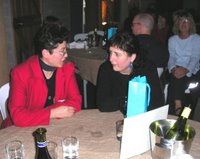 Ann Luzeckyj, from the University of South Australia, (pictured right with Li Wang (left) from Aukland University) was one of the winners of the “best conference paper” awards at the Lifelong Learning conference in Yeppoon. Her presentation was called What is at the centre of the discourse about student centred learning?. It was based on work she is doing for her doctorate, and she was looking at the ways in which the terms “lifelong learning” and “student centred learning” were being used and interpreted. She is using critical discourse analysis for this part of her work - so that involves close analysis of the literature and documents that are using the terms.
Ann Luzeckyj, from the University of South Australia, (pictured right with Li Wang (left) from Aukland University) was one of the winners of the “best conference paper” awards at the Lifelong Learning conference in Yeppoon. Her presentation was called What is at the centre of the discourse about student centred learning?. It was based on work she is doing for her doctorate, and she was looking at the ways in which the terms “lifelong learning” and “student centred learning” were being used and interpreted. She is using critical discourse analysis for this part of her work - so that involves close analysis of the literature and documents that are using the terms.Obviously “Lifelong learning” is a concept that people often revisit in this conference! I think I already mentioned André Grace’s keynote, which included tracing the changing meaning of lifelong learning, varying between education for social and educational empowerment, to a means of readying the workforce etc. Ann identified the way in which current educational bodies refer to education like a commodity which can be grown, developed, exported etc. - a shift away from seeing it as a “democratic entitlement.” In this context, lifelong learning becomes a a way of training “human capital” to support economic development.
Ann explored the concept of “student centred learning”, where institutions are seen as responsible for preparing students to be active learners, and then the responsibility for learning is placed on the individual learner. Ann cited Rose talking about the “responsibilisation of individuals” with people being seen as having a duty to improve their lot and contribute to the wellbeing of the country. Ann also linked this in with an interesting critique of the “sage on the stage vs. guide on the side” view of teaching - but I think I’ll save that for another posting. I must say I enjoy the lifelong learning conference as it does allow for more reflective discussion about what’s happening in education, rather than focusing just on “practical” issues.
The Rose reference is: Rose, N. (1999) Reframing political thought. Cambridge: Cambridge Uni Press. (nb I haven’t read this myself!)
No comments:
Post a Comment